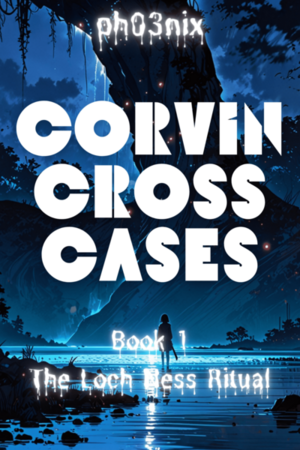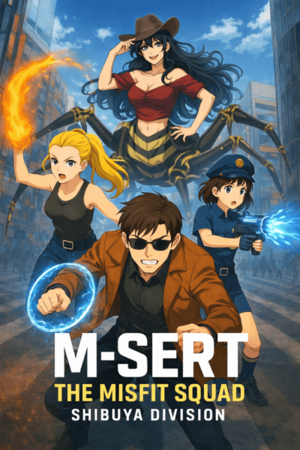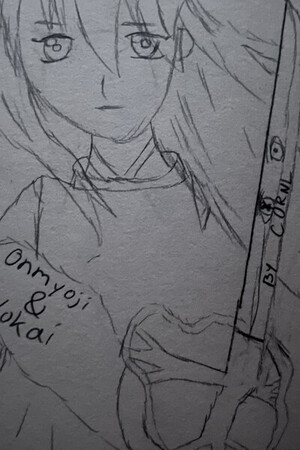Chapter 3:
The Scene of Ritual
Corvin Cross Cases [Book 1 : The Loch Ness Ritual]
The village of Drumnadrochit wasn’t so much a settlement as a nervous outpost clinging to the loch’s western shore. It was a place built on a single industry: the monster. Souvenir shops peddling plush Nessies and ‘authentic’ kelpie water stood shuttered and silent, their gaudy signs looking cheap and forlorn in the damp, grey air. The mist here was a physical presence, a wet cloth pressed against the face, muffling sound and reducing the world to a radius of fifty murky feet.
Corvin found the police presence not by sight, but by sound: the low crackle of a static-riddled radio that cut through the oppressive silence. A single patrol car was parked haphazardly on the gravel, its blue lights throwing erratic, sickly pulses into the gloom. A length of frayed crime scene tape was strung between a lamppost and the gnarled branch of a hawthorn tree, fluttering weakly.
Leaning against the car, a man in a sergeant’s uniform looked less like an officer of the law and more like a man who had been personally defeated by the landscape. He was in his fifties, with a face carved from weathered granite and a thick, pepper-grey moustache that seemed to droop with the weight of the damp. His eyes, when they flicked up to regard Corvin’s approach, held a deep, resigned exhaustion.
“You’re the man from Edinburgh, aren’t you?” the sergeant said. His voice was a low rumble, like stones grinding together at the bottom of the loch. He didn’t offer a hand. “Boyd.”
“Corvin Cross.” Corvin’s tone was brisk, professional, a deliberate contrast to the sergeant’s funereal demeanor. “I was contacted by a solicitor in Inverness. They said there was an incident that required a… rational perspective.”
Boyd’s eyes narrowed slightly, as if the word ‘rational’ was a foreign, and slightly offensive, concept. He gave a short, humourless bark that might have been a laugh. “Aye. Rational. Right then. Come and see what’s rational about this.”
He turned without another word and led the way down a slick path toward the water’s edge. The gravel gave way to thick, sucking mud that clung to their boots. The sound of the water, a soft, insistent lapping, grew louder. The mist seemed to coil more thickly here, as if trying to hide something. The air grew colder, carrying a new, foul cocktail of smells—the usual loch-side decay of wet earth and rotting vegetation, but underneath it, the cloying sweetness of beeswax and something else, something metallic and old. The hairs on Corvin’s arms prickled against the cold, damp fabric of his coat.
'Temperature drop of at least five degrees', Corvin’s mind noted, automatically cataloging the data. 'Proximity to the large heat sink of the water. The smell is candles and… iron oxide. Rust. Nothing anomalous.'
Boyd stopped at the water’s edge and gestured with a tired hand. “There. See for yourself.”
The scene unveiled itself from the mist like a nightmare developing in a photographer’s tray. The body of a man in a dark cassock lay on his back upon a wide, flat slab of rock that was half-submerged in the black water. He was older, with a kind, pale face now waxy and still. His hands were clasped neatly over his chest, fingers interlaced as if in fervent prayer. It was a pose of serene devotion, brutally at odds with the fact that he was lying dead on a cold stone in a loch.
But it was the details that stole the breath, that pushed the scene from murder into the realm of the macabre. Dozens of floating candles, the small kind used in vigil services, bobbed gently on the slight swell of the water, their tiny flames flickering in the damp air, casting dancing, unsteady shadows across the dead man’s face and the dark water. They formed a loose, shimmering circle around the slab.
And at his head and feet, arranged with terrible precision, were rusted iron Celtic crosses, each nearly two feet high. They were old, pitted by time and water, their intricate designs worn smooth in places. They stood like silent, grim sentinels guarding a sacred, horrifying relic. The water lapped gently at the edges of the stone, the sound a soft, rhythmic counterpoint to the frantic beating of Corvin’s own heart. It was a scene of sanctified horror, a blasphemous altar arranged for a audience of mist and shadows.
Sergeant Boyd shuffled his feet, his voice dropping to a superstitious whisper. “Father Alban. From the church up the way. A good man. No reason for anyone to do… this.” He shook his head, his eyes fixed on the flickering candles. “It’s the Bean Nighe’s work, I tell you. The washerwoman. A death omen. Seen her myself, once, down by Urquhart Castle. Or something worse from the loch. Woke it up with all their noise and their boats. Nothing for it now but to wait and see who’s next.” He said it with the absolute, grim certainty of a man stating a natural law.
The transition in Corvin was instantaneous and absolute. The chilling spectacle, the sergeant’s folkloric dread—it all receded, fading into a dull background hum. The investigator’s mode engaged, a cold, clear lens of logic snapping into place over his vision, blocking out the superstitions. His pulse slowed, his breathing evened. This was no longer a scene of horror; it was a crime scene. A complex, theatrical, and utterly human crime scene.
He held up a hand, cutting off any further supernatural commentary from Boyd. “Sergeant. The tape, if you please.”
Without waiting for a response, he ducked under the flimsy barrier. He ignored the main spectacle for a moment, his trained eyes scanning the periphery. He dropped to a crouch, careful to avoid the muddiest patches. The mud at the water’s edge was thick and imprinted with deep, vague shapes. The mist seemed to watch him, a silent, cold witness.
“Boot prints,” Corvin murmured, not to Boyd, but to himself, narrating his own deductions. “Multiple sets. One larger, deep heel—likely yours, Sergeant, from earlier. But here…” He pointed to a clearer, smaller print closer to the water. “Smaller sole. Good tread. Not a work boot. Athletic or hiking. Recent.” He pulled a small camera from his tech vest and began taking photographs, the flash stark and clinical against the soft glow of the candles. He then focused on the candles themselves, still bobbing in the water. He took a sample vial from his kit and carefully scooped up a few, letting the water drain out.
“These haven’t been burning long. Maybe an hour. The wax hasn’t even begun to form a proper pool yet.” He sniffed the water in the vial. “Standard church supply. Mass-produced. Available anywhere.”
He finally turned his attention to the body itself, his gaze clinical, detached. He noted the positioning of the hands. The pallor of the skin.
“The crosses,” he said, his voice flat. “Heavy. Rusted. How were they brought here? There are no drag marks in the mud leading to the water. They were placed from a boat.” He looked out at the vast, mist-shrouded loch. “Or by someone who waded in. The water is cold. Hypothermia would set in quickly. This was planned. Efficient.”
He stood up, his eyes sweeping over the entire, dreadful tableau one last time. The praying hands. The flickering candles. The rusted crosses.
“This isn’t the work of a ghost or a death omen, Sergeant,” Corvin stated, his voice cutting through the Highland mist with the certainty of steel. “This is a criminal performance. And every performance has a stage manager behind it.”
He looked from the terrified, superstitious policeman to the dark, waiting water.
“The question isn’t ‘what’ did this. It’s ‘who.’ And more importantly, ‘why’ go to such theatrical lengths?”




Please sign in to leave a comment.